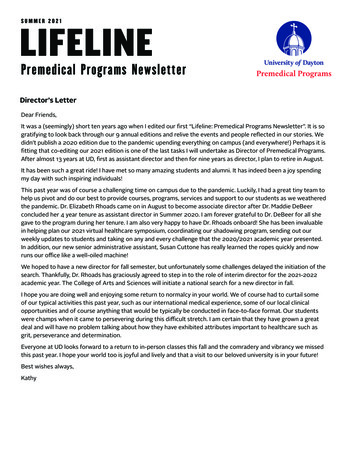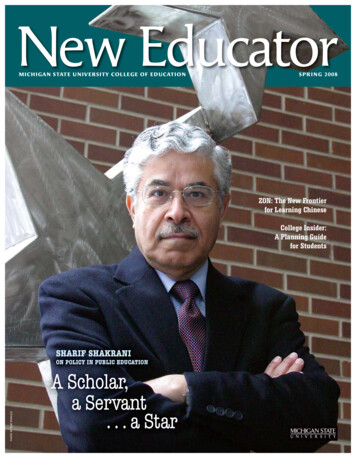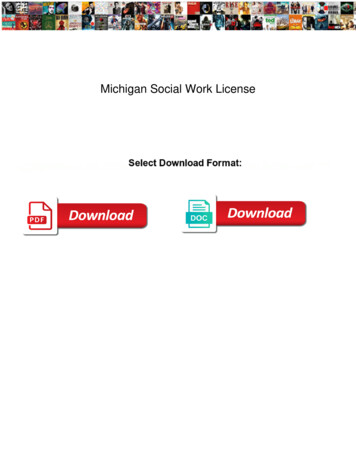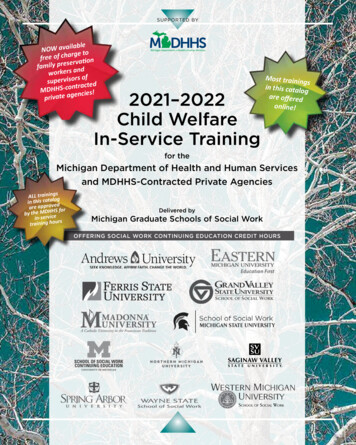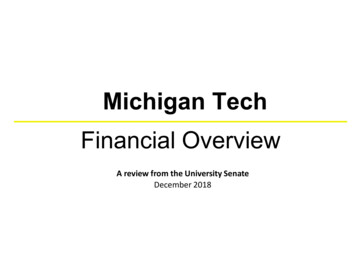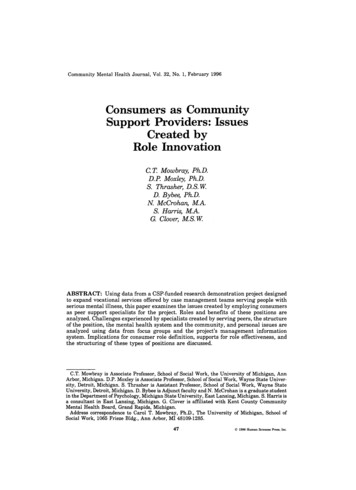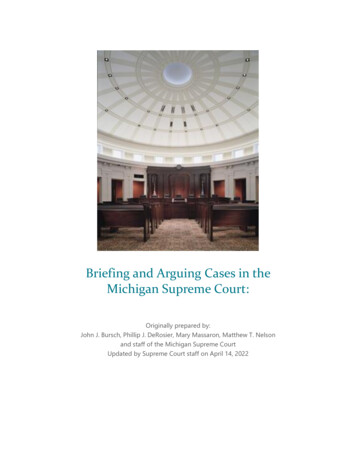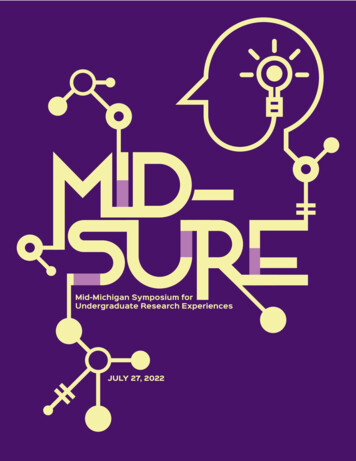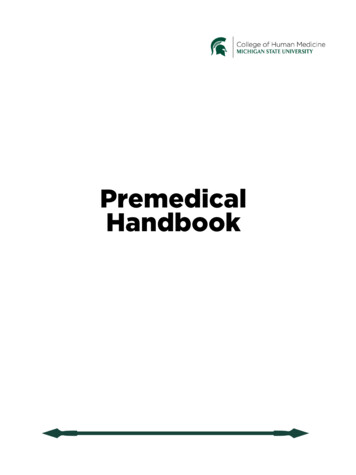
Transcription
PremedicalHandbook
Michigan State University College of Human MedicinePremedical HandbookThe Premedical Handbook and Self-Assessment Guide reflect the insights of premedical advisors,successful medical students, medical school faculty, and Committee on Admissions members.Designed to organize your planning and preparation for medical school, it contains information andadvice that the College of Human Medicine associates with a successful medical school application.As you identify yourself as a possible future physician, you enter an exciting and busy time. Along withall the other joys and demands of life, it is a time to: Challenge your talent and satisfaction in working with the sciences Tap into your abilities and energy as you put altruism into action Test your tolerance of an intellectually and physically rigorous lifestyle Explore your communication skills and leadership potential Engage in realistic self-appraisal and self-improvement effortsFollowing these guidelines will help confirm your career direction as you prepare for the profession.The Premedical Handbook outlines the foundation for successful preparation. Following this guideand your premedical advisor’s advice will assist you in becoming a well-rounded applicant; however, itdoes not assure medical school admission. Some individuals apply prematurely and may not yet havethe experience base or academic profile to predict success. Others may be well prepared yet were notselected for admission in a given application cycle. Take time to reflect on your goals and abilities asyou proceed, and consider alternatives as appropriate.If our mission is consistent with your career goals and our curriculum is consistent with your learningstyle, we encourage you to apply to the College of Human Medicine. Please take some time to visit thepages within our website to learn more about us.The Self-Assessment Guide will help you evaluate your experiences and personal development.Ideally, you will begin your self-assessment early in your college experience to guide and record yourpreparation. Please do not assume that the order in which topics appear reflects an order ofimportance. Visit the AAMC’s Navigate Your Journey from Pre-Med through Residency page foradditional information to consider while preparing to apply to medical school.We encourage current applicants to review the Self-Assessment Guide as they complete secondaryapplications, prepare for interviews, and plan for possible reapplication. All medical school applicantsshould continue to develop themselves as potential medical students and future physiciansthroughout the application year.2
Medical School Application General Recommendations Review your Self-Assessment Guide and work hard to develop strategies to override any deficiencies you findprior to application. If you are not initially admitted, reassess and correct your deficiencies if you intend to reapply. Find valuable information about the medical schools you intend to apply to, including important deadlines, in theAAMC Medical School Admissions Requirements (MSAR). Develop a budget and identify resources to cover medical school application expenses. Consider the cost of theAMCAS application, the MCAT, application fees for individual schools, transportation, accommodations, andwardrobe. For more information, visit the AAMC page, The Cost of Applying to Medical School. While your AMCAS application can be submitted for verification in early June, the College of Human Medicineencourages you to submit your best application to AMCAS. This may mean you will want to wait until you receivesummer grades or complete summer clinical experiences or research projects. However, be aware that othermedical schools do operate on a first-come, first-served basis. Develop a career contingency plan for your future in case medical school is not a realistic goal for you at this time. Refer to the sections of your Self-Assessment Guide that list all your activities (medical/clinical, community service,group/leadership, research, and employment) since high school. Be sure these activities are incorporated intoyour application. Refer to the sections of your Self-Assessment Guide that list the insights you gained through your experiences.Use these to enrich your personal statement and secondary essays. Take special care with your written (AMCAS and secondary) applications. Be sure there are no careless errors. Use aproofreader in addition to spell check. Write your own responses for the AMCAS personal statement and secondary essays. Do not permit proofreadersto alter the content of your statements. If you are a science major, be sure you have taken enriching courses in the arts, humanities, and social sciences. If you are a nonscience major, be sure that you have acquired science knowledge that will support success in therigorous, fast-paced science curriculum of medical school. Required premedical science courses make you eligibleto enroll, but may not be sufficient preparation. Be thoughtful about medical ethics and moral problems in medicine. Take a medical ethics course, if possible, orread about medical ethics. Be familiar with health care reform and the issues that health care professionals confront. If possible, take a coursein the sociology of health care systems course and/or medical economics, or read about these topics. Be aware of current topics in the news regarding medical research. Consider whether you may wish to pursue a combined degree, such as an MD/PhD or an MD/MPH.3
High School Students and Nontraditional/Postbaccalaureate ApplicantsAdvice for High School StudentsHigh school students interested in health careers are invited to apply to Michigan State University. MSU is aninternationally renowned land grant institution committed to excellence in teaching, research, and communityoutreach. Academic and premedical advisors will assist you in developing an academic schedule to meet premedicalrequirements. Premedical groups, service organizations, and the MSU Center for Service-Learning and CivicEngagement will assist you in your nonacademic preparation.To obtain a MSU online undergraduate application, visit the MSU Office of Admissions website. For informationabout visiting the university, view the Office of Admissions Visit Campus page. You can learn more about premedicaleducation and advising at the College of Natural Science Advising page .Recommendations Enhance your college prep courses with advanced science classes, four years of mathematics, speech ordebate, psychology or sociology, and computer studies. The College of Human Medicine will recognize APcredit to meet our premedical course requirements only if the credit is posted on your official collegetranscript. You may be asked to demonstrate additional laboratory work at the college level. Foster professional development and maturity through volunteer work, employment in a medicallyrelevant area, and community service. These activities will help focus your commitment to integrity,excellence, self-respect, respect for others who are different from you, and developing compassionaterelationships. Investigate college and university websites, request college and university catalogs, and visit thoseinstitutions that interest you. The Michigan Association of Collegiate Registrars and Admissions Officers(MACRAO) site lists Michigan college and university home pages. When applying to colleges/universities,consider what you can afford, where you feel at home, and which schools offer excellent premedicalpreparation. The College of Human Medicine does not prefer one major over another. Select one that bestlinks your academic interests and your academic talents. Your academic advisor will be able to help you withthis important decision. If you are attending one of our partner universities-----Alma College, Aquinas College, Calvin College, GrandValley State University, Hope College, Kettering University, Lake Superior State University, MichiganTechnological University, Northern Michigan University, Saginaw Valley State University, or the Universityof Michigan-Flint-----you may want to find out more about the Early Assurance Program. If you are attending Michigan State University, you may be interested in the Early Assurance Opportunity.Advice for Nontraditional/Postbaccalaureate ApplicantsNontraditional applicants are those who have completed a baccalaureate program (BA, BS, or equivalent) from anaccredited college or university. Some nontraditional applicants have earned advanced degrees and/or pursued avariety of medical or nonmedical careers and now wish to earn an MD degree. Nontraditional applicants may or maynot need to improve their academic and experiential profile.4
Nontraditional students who were not science majors or who have not taken any science courses in the three yearsprior to beginning of medical school may benefit from taking upper-level science courses such as anatomy,biochemistry, cell biology, embryology, genetics, microbiology, molecular biology, immunology, neuroscience, orphysiology. If your undergraduate science GPA is a weakness of your application, complete additional sciencecoursework through a postbaccalaureate or graduate program. Complete at least 16 to 32 additional undergraduate orgraduate science semester credits by the time you submit their AMCAS Application.Postbaccalaureate applicants are those who need to enhance an existing academic record; these students have takenthe requisite courses, but need to improve their GPA to increase the competitiveness of their medical schoolapplications. Postbaccalaureate applicants should complete at least 16 to 32 additional postbaccalaureate sciencesemester credits by the time they submit your AMCAS Application.Both nontraditional and postbaccalaureate applicants should review the suggestions offered to traditional applicants,including the sections on professional development and investigation of medical schools. Your time frame will bedifferent, but the recommendations are the same.All applicants to CHM must complete the premedical requirements before matriculating. These courses can becompleted at any time during your post-high school education and may be taken at any accredited US or Canadiancollege or university. Courses may also be completed at any accredited community college or junior college if they areaccepted as transfer credit at an accredited US or Canadian four-year college or university. To verify if a particularcourse is accepted at MSU, visit Transfer MSU , the university’s searchable transfer credit equivalency system.A premedical or academic advisor at your local college or university can assist you in planning your coursework andMCAT exam date. You want material to be fresh in your mind for the MCAT. This can be accomplished through recentcourses and/or thoughtful, intense review. Consider using MCAT preparatory materials. Visit Prepare for the MCATExam for more information.American Medical College Application Service (AMCAS)All applicants to the College of Human Medicine at Michigan State University must begin the application process bysubmitting a primary application to the American Medical College Application Service (AMCAS), part of theAssociation of American Medical Colleges (AAMC).AMCAS is a nonprofit, centralized application processing service developed by the AAMC in cooperation with a teamof medical school admissions officers to simplify and standardize the application process to medical school. Most USand Canadian medical schools use AMCAS as the primary application method. You cannot apply directly to theCollege of Human Medicine.The AMCAS Application provides an opportunity to write a personal statement, list and describe activities, and reporta disadvantaged background, if applicable. Transcripts for all academic work must be sent to AMCAS as instructed.Letters of evaluation must be submitted through the AMCAS Letters Service. AMCAS automatically notifies us whenyour verified application, released MCAT scores, and letters of evaluation are available.While you can submit your AMCAS application in early June, the College of Human Medicine encourages you tosubmit your best application. This may mean you want to wait until you complete clinical experiences, researchprojects, or receive summer grades. However, be aware that other medical schools operate on a first-come, firstserved basis.5
Medical College Admission Test (MCAT)The MCAT Exam is a standardized, multiple-choice exam designed to assess the problem solving, critical thinking,and knowledge of science concepts and principles prerequisite to the study of medicine. Scores may predict howwell applicants may perform in certain medical school courses and on required medical board examination series forlicensure. Your scores on the MCAT represent only one important component of your medical school application.If your MCAT scores are lower than you hoped for, discover the cause before you retake the MCAT. Discuss with youradvisor resources and solutions to strengthen the areas you may need to strengthen.The MCAT is administered as a computerized exam only. Thomson Prometric delivers the computerized MCAT onbehalf of the AAMC multiple times per year, at hundreds of testing sites in North America and select sites in Europe,Asia, Australia, Africa, and the Middle East. The MCAT Program Office will inform you of testing locations, MCAT feesand fee waivers, MCAT registration deadline dates, and MCAT test dates.The timing of application and admissions cycles are such that the latest you can take the MCAT for the currentapplication cycle is mid-September (for example, the latest MCAT date for 2016-17 application cycle is September 10,2016). The College of Human Medicine only accepts MCAT scores that are no older than four years (i.e., 2013 scores for2016-17 application cycle).Recommendations Prepare NOW!! There is no substitute for long-term preparation for the MCAT. It begins with your firstcollege course. Attend every class; take good notes and review them thoughtfully. Understand thematerial, do all your assignments, and attend office hours. Get excited about learning! Pay special attention to the basic science concepts that unite the sciences. Begin to see science as anintegrated whole rather than separate and distinct content area. Take advantage of office hours or make appointments with your science professors to discuss the unity ofthe biological and physical sciences. Become able to discuss science and science concepts. Take courses that will develop your critical reading and writing skills. If these are weaker areas for you, getadditional help now! Use AAMC MCAT Practice Tests, available online or at college bookstores. Use AAMC materials or your choice of MCAT guidebooks in conjunction with basic science courses. Usingthe guidebooks and practice tests as you complete coursework may enhance both your learning and testtaking abilities and may help you earn higher grades while you prepare long-term for the MCAT. One full year before you take the MCAT, prepare a calendar to guide your final preparation. A sample planmay include two months review of each of the following courses: biology, general chemistry, organicchemistry, and physics. Begin the review with the course that was most difficult, or was taken the longestago. Progress one course at a time, finishing with the course that was least difficult or taken most recently.Spend some extra time studying biochemistry, genetics, and physiology. Reserve at least a month beforethe MCAT for a comprehensive review. The College of Natural Science offers preprofessional resources on the MCAT, including a MCAT CourseGuide Plan for those students considering a career in medicine. In addition, they host special events andworkshops throughout the year.6
Academic PreparationAll students admitted to the College of Human Medicine must successfully complete the College’s premedicalrequirements prior to matriculation into medical school. The courses listed are minimum requirements. CHM stronglyencourages applicants to take additional, upper-level courses in anatomy, biochemistry, cell biology, embryology,genetics, microbiology, molecular biology, neuroscience, and physiology. Applicants are also encouraged to enroll incourses that promote understanding of the arts, humanities, ethics, social sciences, and cultural differences.Any college major is acceptable. Select one that will be stimulating and personally satisfying. Premedicalrequirements may be within your major, taken as electives, or added to your course of study. Keep in mind that thenational mean GPAs for applicants accepted to medical school are an overall GPA of 3.7 and a science GPA of 3.6.The College Committee on Admissions reviews applicants’ science and nonscience grades, taking note of the difficultyof coursework, number of credits attempted and completed each semester, trend in grades, and overall averages.Your grades represent only one important component of your medical school application.RecommendationsUndergraduate ProgramFor an optimal academic experience, it is essential that you choose a major that suits you. Since CHM does notprefer one major over another, you are free to select the major that best links your academic interests andyour academic talents. Your academic advisor will be able to help you with this important decision. Stay academically focused to do your best in your courses. Attend class regularly. Take advantage ofoffice hours and tutorial sessions. Discover how you learn most effectively and efficiently. In addition to your coursework, consider the following suggestions:o Meet with your academic advisor on a regular basiso Become involved in a research setting or project when possiblePostbaccalaureate ProgramIt is important to develop a contingency plan for your future in case you are not accepted to medical school.This is especially important for applicants whose grades are at the lower range. If your undergraduate GPA is aweakness of your application, that contingency plan should include additional academic coursework, usuallythrough a postbaccalaureate program. Complete at least 16 to 32 additional undergraduate science semester credits between the timeyou graduate from college and the time you reapply to CHM. Enroll in required premedical science courses. If you took premedical science courses and did well inthem, consider taking additional science courses such as anatomy, biochemistry, cellular andmolecular biology, embryology, genetics, neuroscience, microbiology, physiology, or statistics. Do your best to achieve grades in the range of 3.5-4.0 in all of your science courses. Take courses that are interesting or meaningful to you and/or will be helpful in following through withyour contingency plan.7
Graduate ProgramMany physicians also have an advanced science degree, a business degree, or an advanced degree in publichealth, epidemiology, or medical ethics. Select an advanced degree program in which you have talent andresearch interest. An advanced degree may open an alternate career path or make you a more highlysought-after physician. It is very important to time your medical school application so you will be admittedonly after you have completed the requirements for your advanced degree program. Deferred matriculationmay be available for accepted applicants who are completing graduate programs. Please discuss your planswith your advisors. Do your best to achieve grades in the range of 3.5-4.0 in all of your graduate courses. Remember that many graduate degree programs require the Graduate Record Examination (GRE). TheGRE is administered electronically throughout the year. Graduate school application deadlines vary, but applying early is thought to be essential if you hopeto secure a graduate assistantship. Investigate several universities and medical centers to discover programs that interest you.Premedical RequirementsPremedical requirements are minimums that must be fulfilled prior to matriculation at the College of HumanMedicine. Your AMCAS academic record will be reviewed for completion of our premedical requirements. If you areinvited to interview, you will need to complete the Premedical Requirements form. If any deficiencies or discrepanciesare found, Admissions staff will discuss it with you on Interview Day or contact you by email shortly thereafter.Undergraduate coursework must be completed at an accredited US or Canadian four-year college or university. Thereis no preference about where you complete your premedical courses, as long as they are completed at an accreditedUS or Canadian undergraduate institution. Courses may also be completed at any accredited community college orjunior college if they are accepted as transfer credit at an accredited US or Canadian four-year college or university. Toverify if a particular course is accepted at MSU, visit Transfer MSU, the university’s searchable transfer creditequivalency system. There is no requirement about how recently your undergraduate courses or premedicalrequirements were completed; however, more recent coursework or advanced study in the basic sciences is preferred.If you are accepted to the College of Human Medicine, you will be required to submit official transcripts from allpost-secondary schools you have attended (AMCAS does not forward transcripts). Transcripts are reviewed for thecompletion of any degree(s) listed on your AMCAS application and any incomplete premedical course requirement(s)you indicated on your AMCAS application. If there are changes in premedical courses you indicated you wouldcomplete and/or degrees you indicated you would earn, please email us at MDadmissions@msu.edu right away.The MSU College of Human Medicine premedical requirements include a set of course prerequisite “options” to beimplemented. These various models are used for the College of Human Medicine admissions standards. It is stronglyadvised that each potential applicant review these admissions requirements early in your academic career with youracademic and/or preprofessional advisor so that you can best determine which academic prerequisite option is best foryou in the context of your planned course of undergraduate study.8
AP/CLEP CreditWe accept AP and CLEP credit to meet premedical course requirements, if documented on an official transcript.Please note that lab credit will still be required. Applicants may meet lab credit with the lab sections of advancedscience courses or practical experience, such as documented relevant experience in a research lab.Canadian Coursework We accept courses from accredited Canadian universities that belong to Universities Canada. We accept Grade 13 English combined with writing-intensive courses toward fulfillment of ourEnglish/Writing/Composition requirement, with proper documentation. A one-year Canadian course will fulfill our one-year course series requirement. However, a lab componentmust be included with at least one of each of the applicant’s biology, general chemistry, and organicchemistry courses.If you have any questions or need more information about our premedical requirements, please email the Office ofAdmissions at MDadmissions@msu.edu.Medical/Clinical ExperiencesYour goal to become a physician must be based upon experience. Long term, in-depth medical/clinical work and/orvolunteer experiences will help you understand yourself and the medical profession while serving others. Seek outmedical, clinical, and shadowing opportunities, whether paid and volunteer, within your community and your collegeor university.Recommendations If you are an MSU student, visit the MSU Center for Service Learning and Civic Engagement websiteto look for medical/clinical volunteer experiences in the Lansing area.Train and serve as a hospice volunteer (see the Yellow Pages). Contact volunteer coordinators at your local American Red Cross, hospitals, geriatric centers, or clinics. Secure a position providing home health care services. Work as a Certified Nurse’s Assistant (CNA), an EMT, or at a camp for disabled or chronically ill children. Secure a physician mentor. Contact your own physician or physicians who practice in the medical careerareas that most interest you. Keep a journal detailing the insights you have gained from your medical/clinical experiences. This canassist you when writing personal statements and secondary essays. 9
Community Service ExperiencesPhysicians serve people from a variety of economic and educational backgrounds as well as a variety of cultural andethnic backgrounds. Become more culturally competent while offering your time and talents to others.Recommendations If you are a Michigan State University student, visit the MSU Center for Service Learning and CivicEngagement website to identify community service experiences in the Lansing area. Volunteer for service organizations and become an active participant. Consider the American Red Cross,your local Chamber of Commerce, Habitat for Humanity, community recreational facilities, faith-basedorganizations, homeless shelters, food banks, domestic assault centers, public schools, etc. Contact the Resource Center for Persons with Disabilities (or equivalent) at your college. Contact the community organizers of Special Olympics or Big Brothers/Big Sisters. Volunteer at a summer camp for disabled or chronically ill children. Participate in Alternative Spring Break. Consider Peace Corps or AmeriCorps service.Group and Leadership ExperiencesRecommendationsBecome involved in activities that interest you; make yourself a contributing member. Eventually assumeleadership roles in some of your activities and organizations. Leadership can be demonstrated through formalpositions in organizations such as your premedical society, cultural or religious groups, or a cooperative livingsetting. Informal leadership is also recognized. Reliable participation and thoughtful contribution to thecommunity in positions such as a Big Brother/Sister or a tutor is also valued.Leadership skills can be developed and recognized on the job as a shift leader or in a management position. Paycareful attention to your role in each setting. Are you able to accept the responsibilities of a leadership positionand inspire the support of your colleagues? Can you serve as an enthusiastic, cooperative team member foranother leader? What are your teaching and learning roles within each setting? What are you giving and gainingfrom your associations with other group members? How is what you are learning relevant to working in teams as aphysician?10
Research ExperiencesRecommendationsSpend time thinking about the topics or courses about which you are most excited and curious. Seriously considerbecoming involved in research. Remember, research is not limited to science and medicine. There are multipleresearch opportunities in nonscience areas.Speak to your professors and advisors about research. Contact the academic department(s) you are mostinterested in and explore their websites. Make a list of professors with active research projects. Carefully readabout their research studies. Decide on two or three studies in which you are most interested and makeappointments to talk with these research study directors. Provide them with a copy of your résumé and a letterstating your interest in their project.Undergraduate students who have proven their talents, dependability, and interest in a research project byvolunteering may eventually be paid for their work in research settings.Personal Qualities/Professional Behavior DevelopmentThe College of Human Medicine Committee on Admissions carefully evaluates applicants for their commitment tostandards that are associated with exemplary professional behavior. Think about the behaviors expected ofprofessionals and speak to your mentors about these expectations. Examine your current behavior in light of theseexpectations.Recommendations Seek enriching and challenging life experiences. Perform ongoing self-reflection to learn from your experiences. Take a medical ethics course, if possible, or read about medical ethics.Letters of EvaluationCHM requires a minimum of three and a maximum of five letters of evaluation. Letters of evaluation must besubmitted through the AMCAS Letters Service. AMCAS begins accepting letters in mid-May. Instructions forsubmitting letters to AMCAS are provided within the AMCAS application. Unsolicited letters sent directly to thecollege outside of the AMCAS Letters service will not be reviewed, placed in your file, or retained in any form; theywill be discarded.Letters of evaluation should follow these guidelines: One letter must be from a basic science or medical science professor who can critically evaluate youracademic potential, maturity, strengths and weaknesses, and the difficulty of coursework, ifapplicable. Comments that expand beyond what may be reflected by your grade in the class or address anyspecial achievements or attributes are desirable.11
One letter must address personal experiences and characteristics that will help us to develop an overallportrait of you. A letter based upon direct interaction with you and addressing qualities such as maturity,empathy, character, reliability, interpersonal skills, and any special attributes or experiences will be the mosthelpful. It is highly desirable that at least one letter is written by someone who has observed you in a clinical setting. All letters should be from individuals who know you well. Letters should be submitted on college/university or business letterhead and must contain clear and currentcontact information for the author. Additional letters may be authored by individuals from an academic, clinical, employment, research, orvolunteer setting. People who know you well and who can attest to your character and abilities based upontheir personal ex
Navigate Your Journey from Pre-Med through Residency page for additional information to consider while preparing to apply to medical school. We encourage current applicants to review the Self-Assessment Guide as they complete secondary applications, prepare for interviews, and plan for possible reapplication. .
